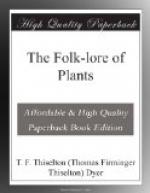According to Mr. Fergusson, tree-worship has sprung from a perception of the beauty and utility of trees. “With all their poetry,” he argues, “and all their usefulness, we can hardly feel astonished that the primitive races of mankind should have considered trees as the choicest gifts of the gods to men, and should have believed that their spirits still delighted to dwell among their branches, or spoke oracles through the rustling of their leaves.” But Mr. McLennan[4] does not consider that this is conclusive, adding that such a view of the subject, “Does not at all meet the case of the shrubs, creepers, marsh-plants, and weeds that have been worshipped.” He would rather connect it with Totemism,[5] urging that the primitive stages of religious evolution go to show that, “The ancient nations came, in pre-historic times, through the Totem stage, having animals, and plants, and the heavenly bodies conceived as animals, for gods before the anthropomorphic gods appeared;” While Mr. Herbert Spencer[6] again considers that, “Plant-worship, like the worship of idols and animals, is an aberrant species of ancestor-worship—a species somewhat more disguised externally, but having the same internal nature.” Anyhow the subject is one concerning which the comparative mythologist has, at different times, drawn opposite theories; but of this there can be no doubt, that plant-worship was a primitive faith of mankind, a fact in connection with which we may quote Sir John Lubbock’s words,[7] how, “By man in this stage of progress everything was regarded as having life, and being more or less a deity.” Indeed, sacred rivers appear in the very earliest mythologies which have been recovered, and lingered among the last vestiges of heathenism long after the advent of a purer creed. As, too, it has been remarked,[8] “Either as direct objects of worship, or as forming the temple under whose solemn shadow other and remoter deities might be adored, there is no part of the world in which trees have not been regarded with especial reverence.
’In such green palaces the
first kings reigned;
Slept in their shade, and angels
entertained.
With such old counsellors they did
advise,
And by frequenting sacred shades
grew wise.’
Even Paradise itself, says Evelyn, was but a kind of ’nemorous temple or sacred grove,’ planted by God himself, and given to man tanquam primo sacerdoti; and he goes on to suggest that the groves which the patriarchs are recorded to have planted in different parts of Palestine may have been memorials of that first tree-shaded paradise from which Adam was expelled.”




